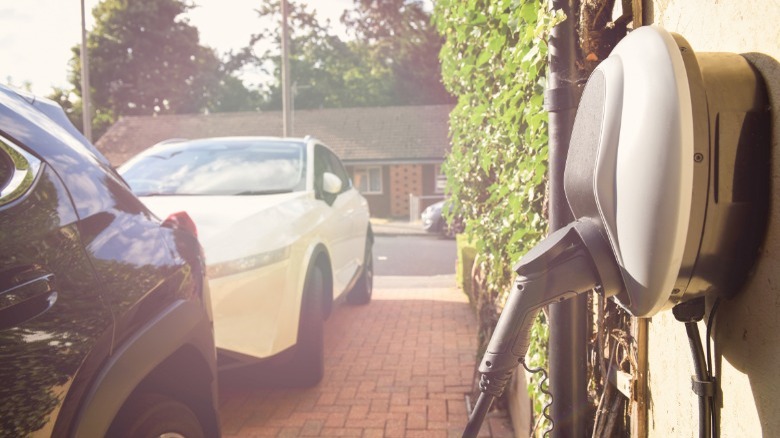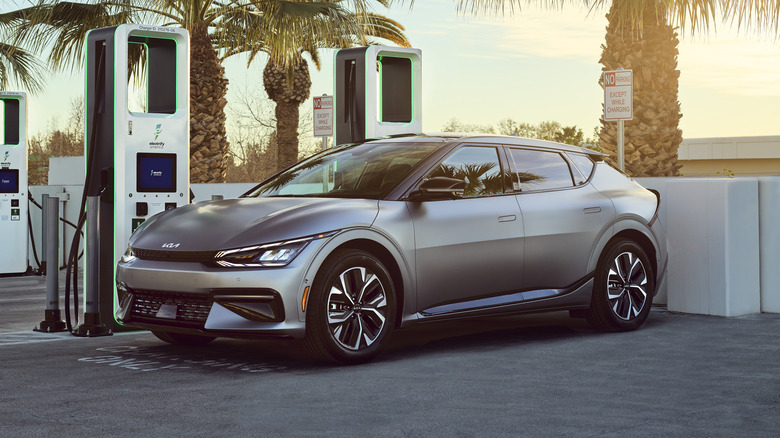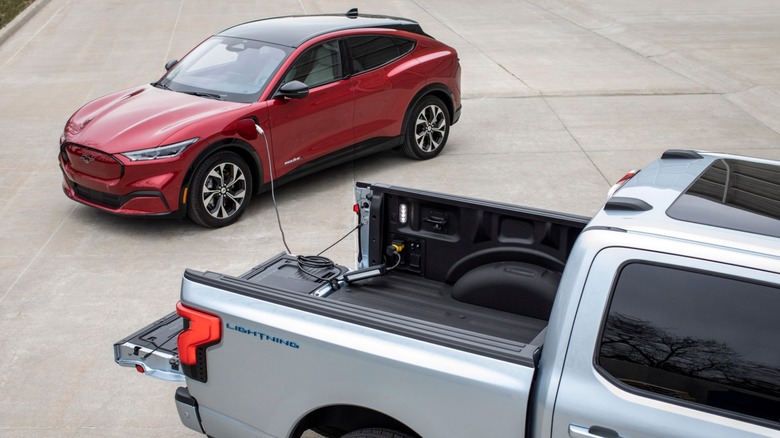

How Many EV Owners Run Out Of Charge? The Number Might Surprise You
source link: https://www.slashgear.com/1205093/how-many-ev-owners-run-out-of-charge-the-number-might-surprise-you/
Go to the source link to view the article. You can view the picture content, updated content and better typesetting reading experience. If the link is broken, please click the button below to view the snapshot at that time.

How Many EV Owners Run Out Of Charge? The Number Might Surprise You
Between the snappy acceleration, near-silent ride, low maintenance cost, and wealth of tech trickery, it's easy to see why people are attracted to buying electric vehicles. That's not to say they don't have their issues. Many EVs are expensive, require frequent charging, and can have high maintenance costs. But none of that has slowed the growth of the EV market. As Elektrek points out, the U.S. percentage of EV sales hit 6.7% just in the first half of 2022. In 2019, that number was just 1.8%.
As electric vehicles charge headlong into the future, early adopters and auto-makers have both been learning a lot about the strengths and weaknesses of electric vehicles. Until very recently, range and range anxiety have been some of the biggest obstacles to the proliferation of electric vehicles. While the winds of change are blowing, thanks to initiatives by both private corporations and governments, the myth of getting stranded in the middle of nowhere because your car ran out of electrons persists. Does it hold any water, though? As it turns out, things look much more positive than you'd expect.
The majority of EV owners never even come close to empty

According to a study by Escalent, 64% of EV owners polled have never come close to running out of charge, while 28% say they have come close. Only 8% of EV owners have run out of charge completely. Furthermore, the research noted that 73% of owners expect to charge their electric vehicles at home. While this data is encouraging for EV owners, it's also indicative that range fear may be largely unwarranted.
Data from Visual Capitalist shows that average EV range has increased dramatically, from just 86 miles in 2011 to 217 miles in 2021. Still, SlashGear's own survey results showed 41.6% of people were concerned about the availability of public chargers. Even analysts at J.D. Power say that charging infrastructure is one of the biggest hurdles holding the EV industry back. However, a three-year study conducted by the Idaho National Laboratory found "despite the installation of extensive public charging infrastructure in most of the project areas, the majority of charging was done at home and work."
If EV owners are doing majority of their charging at home, and dead batteries aren't all that common, should industry giants really be focusing their efforts on public charger availability, or is in-home charging the way to go? The answer probably lies somewhere in the middle, since a combination of strong public charging infrastructure and access to in-home charging will cater to the largest variety of prospective EV owners and ensure maximum growth of the industry.
The Most Reliable Electric SUVs On Sale Now

Nearly all major automakers have made public commitments to shift significant portions of their annual production and sales volume to electric vehicles. Some have promised to go all the way, moving 100 percent of their efforts to electric, but before we reach the tipping point, it can be hard to understand what's available and which of the existing products are worth a look.
This applies to electric SUVs, which are uncommon but growing in popularity. Mainstream and premium automakers have announced or are developing new electric family haulers, but many great choices are already on sale today. We've scoured the available electric SUVs to find the models that offer the best reliability and day-to-day ease of use.
The list of reliable electric SUVs is set to explode as several automakers ready new models for the market. BMW, Mercedes-Benz, and nearly every premium automaker have an eye on electrics, and many have already made the shift. Buyers' minds and wallets are with SUVs, too, so car companies are keen to keep new models rolling.
Electric vehicles don't have all the moving parts, fluids, and other components that sometimes lead to expensive repairs in gas vehicles. There are no oil changes and no transmission fluids. Overall, they're simpler. That said, owners still have common wear items to replace, such as tires, brakes, windshield wipers, and more. The fact that EVs require less regular maintenance does not mean they will need no maintenance.
Lastly, EV batteries are wildly expensive to replace and sometimes can cost more than the car's value. That's why automakers issue long warranties for EV batteries and surrounding components.
It's worth noting that all the vehicles you see on this list are new and do not have years of accumulated data from owners, repair shops, and dealers. The EVs here feature solid warranty coverage, and most reviews for these SUVs are positive. Let's get rolling.
Hyundai Ioniq 5 – Kia EV6
We're placing these two together in the list because they share much of their engineering and performance. The EV6 comes standard with an electric motor and a 77.4-kWh battery. The range estimate for the basic EV6 lands at 310 miles, but certain configurations drop below that number with all-wheel drive and more powerful electric motors. Both vehicles ride on the E-GMP platform, which supports various wheelbases and body styles.
Like other Hyundai and Kia models, the Ioniq 5 and EV6 come with a fantastic warranty that includes five years/60,000 miles of basic coverage and ten years/100,000 miles of powertrain coverage. Both bring futuristic styling, great tech, and plenty of space inside. The vehicles offer extended electric capability, including the option to charge other EVs and exterior power equipment. At the same time, the vehicles offer long wheelbases that bring exceptional interior space, both for people and cargo, and top trims edge on premium brands territory with upscale materials and finishes.
Hyundai Kona Electric
The Hyundai Kona got a redesign for 2022, but it remains of the best EV values. A 150-kW electric motor and a 64-kWh battery provide propulsion for the Kona, which offers 201 horsepower and 291 pound-feet of torque. The Kona returns a 258-mile range and offers fast charging, so it can recover up to 80 percent charge in less than an hour using a Level 3 charger. The Kona's interior is simple but usable and comfy. Though it's not a ground-up EV design like the Ioniq 5, the Kona EV's chassis swallows up the battery packs and still offers good interior space, nimble handling, and a comfy ride.
Though the base SE trim gets base features like cloth upholstery and manual seat adjustments for passengers, the top Limited trim adds niceties like leather and ventilated seats. Like it does with its gas vehicles, Hyundai offers a five-year/60,000-mile basic warranty and a staggering ten-year/100,000-mile powertrain warranty. That coverage also includes the battery pack, so you can buy a Kona without worrying about replacing a costly battery for a decade.
Ford Mustang Mach-E
It's strange to say this, but the Ford Mustang Mach-E is one of the elder statesmen on this list. The SUV debuted in late 2020 as a 2021 model and immediately became one of Ford's most popular and hard-to-find models. It's available in several configurations and, despite a few early recalls, has plenty of happy owners. Despite a few early recalls for frightening-sounding issues like the glass roof flying off, the Mustang Mach-E has emerged as one of Ford's more reliable vehicles. It's backed by a three-year/36,000-mile basic warranty and a five-year/60,000-mile powertrain warranty. The battery is covered for eight years or 100,000 miles.
Ford offers the Mach-E with several powertrain configurations. The base option features a 70-kWh battery and an electric motor for a combined 266 horsepower and rear-wheel drive. Other options include a 290-horsepower motor, a 346-horsepower motor, and a 480-horsepower motor. The most efficient combination is the California Route 1 trim and 91-kWh battery, which delivers up to 314 miles of range.
Volkswagen ID.4
Volkswagen plans to build the ID.4 in Chattanooga, TN, but the current models are a solid choice in the ever more crowded world of electric SUVs. Generous safety equipment, substantial range, and lively acceleration all make the Volkswagen a compelling alternative. The base powertrain configuration includes a 62-kW battery and an electric motor that produce 201 horsepower and 229 pound-feet of torque. Front-wheel drive is standard, and all-wheel drive is available. Base rear-drive models deliver a starting range of 275 miles of range, and all-wheel drive variants return 251 miles.
Early reviews faulted the VW for its infotainment system, and it's true – the latest all-touch interface is confounding and clunky. That said, it's not a reason to knock reliability or overall usability, and the interface becomes easier to use over time. Volkswagen backs the ID.4 with a four-year/50,000-mile limited warranty and an eight-year/100,000-mile battery warranty. It also offers two years/20,000 miles of scheduled maintenance and roadside assistance for three years/36,000 miles.
Chevrolet Bolt EUV
Chevy had a nasty run with the Bolt and the new Bolt EUV, as charging issues led to an increased risk of battery fires. After a massive recall and billions of dollars in replaced batteries, the new Bolt and Bolt EUV are ready to rock. The EUV comes with a 65-kWh battery and an electric motor that produce 200 horsepower and 266 pound-feet of torque. Chevy backs the Bolt with a three-year/36,000-mile bumper-to-bumper warranty and an eight-year/100,000-mile electric propulsion limited warranty.
On top of its decent range and power, the Bolt EUV offers 16.3 cubic feet of cargo space, expanding to 56.9 cubic feet with the back seats folded flat. The interior seats five in comfort, thanks to solid head and legroom. Rear headroom is not as impressive, but the Bolt EUV's small item storage, generous standard features, and good cargo space more than compensate for that shortcoming. Buyers can also add GM's excellent Super Cruise hands-free driving system and the top Premier trim adds upscale features like leather and wireless device charging.
Recommend
About Joyk
Aggregate valuable and interesting links.
Joyk means Joy of geeK
